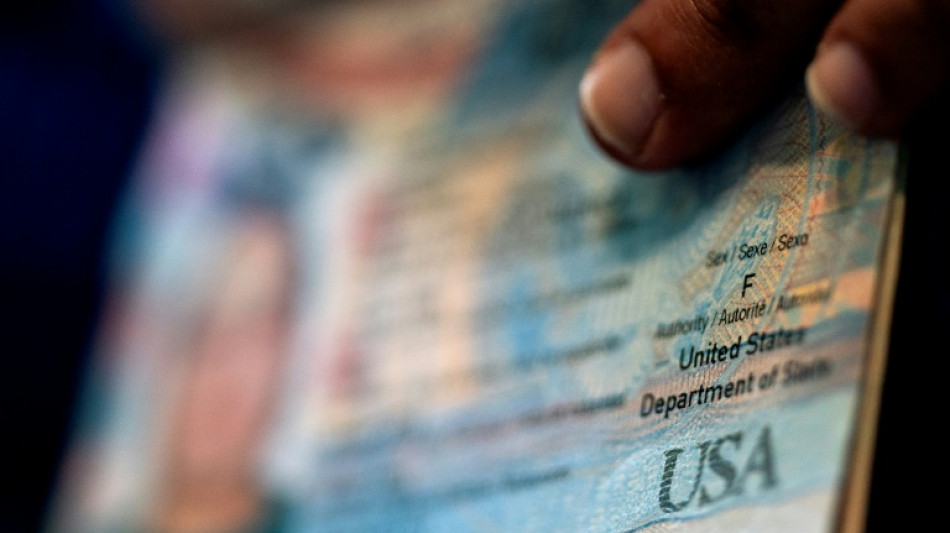
-
 Japan's Panasonic targets 10,000 job cuts worldwide
Japan's Panasonic targets 10,000 job cuts worldwide
-
Putin evokes WWII victory to rally Russia behind Ukraine offensive

-
 China exports beat forecasts ahead of US tariff talks
China exports beat forecasts ahead of US tariff talks
-
Leo XIV, the 'Latin Yankee', to celebrate first mass as pope

-
 Most stocks lifted by hopes for US-China talks after UK deal
Most stocks lifted by hopes for US-China talks after UK deal
-
IPL suspended indefinitely over India-Pakistan conflict: reports

-
 German lender Commerzbank's profits jump as it fends off UniCredit
German lender Commerzbank's profits jump as it fends off UniCredit
-
Rare bone-eroding disease ruining lives in Kenya's poorest county

-
 India says repulsed fresh Pakistan attacks as de-escalation efforts grow
India says repulsed fresh Pakistan attacks as de-escalation efforts grow
-
Zhao's historic snooker title sparks talk of China world domination

-
 'High expectations': EU looks to Merz for boost in tough times
'High expectations': EU looks to Merz for boost in tough times
-
Poisoned guests rarely invited before deadly mushroom lunch, Australia trial hears

-
 China sales to US slump even as exports beat forecasts
China sales to US slump even as exports beat forecasts
-
Indian cricket to make 'final decision' on IPL over Pakistan conflict

-
 Dethroned Bundesliga champions Leverkusen face uncertain future
Dethroned Bundesliga champions Leverkusen face uncertain future
-
China can play hardball at looming trade talks with US: analysts

-
 French monuments in trouble while PSG prepare for Champions League final
French monuments in trouble while PSG prepare for Champions League final
-
Newcastle face Chelsea in top five showdown, Alexander-Arnold in spotlight

-
 Flick's Barca must show 'hunger' in crunch Liga Clasico
Flick's Barca must show 'hunger' in crunch Liga Clasico
-
Clasico the last chance saloon for Ancelotti's Real Madrid

-
 Timberwolves overpower Warriors to level series
Timberwolves overpower Warriors to level series
-
Chinese fabric exporters anxious for US trade patch-up

-
 Putin gears up to host world leaders at lavish army parade
Putin gears up to host world leaders at lavish army parade
-
Nearing 100, Malaysian ex-PM Mahathir blasts 'old world' Trump

-
 Leo XIV, first US pope, to celebrate first mass as pontiff
Leo XIV, first US pope, to celebrate first mass as pontiff
-
Asian stocks lifted by hopes for US-China talks after UK deal

-
 Former head of crypto platform Celsius sentenced 12 years
Former head of crypto platform Celsius sentenced 12 years
-
Ex-model testifies in NY court that Weinstein assaulted her at 16

-
 Nestlé and OMP Showcase Approach to Future-Ready Supply Chain at Gartner Supply Chain Symposium/Xpo in Barcelona
Nestlé and OMP Showcase Approach to Future-Ready Supply Chain at Gartner Supply Chain Symposium/Xpo in Barcelona
-
Genflow Biosciences PLC Announces Share Subscription, Director's Dealing and Update

-
 Argo Blockchain PLC Announces 2024 Annual Results and Restoration of Listing
Argo Blockchain PLC Announces 2024 Annual Results and Restoration of Listing
-
'Great honor': world leaders welcome first US pope

-
 Pacquiao to un-retire and fight Barrios for welterweight title: report
Pacquiao to un-retire and fight Barrios for welterweight title: report
-
Trump unveils UK trade deal, first since tariff blitz

-
 Man Utd one step away from Europa League glory despite horror season
Man Utd one step away from Europa League glory despite horror season
-
Jeeno shines on greens to grab LPGA lead at Liberty National

-
 Mitchell fires PGA career-low 61 to grab Truist lead
Mitchell fires PGA career-low 61 to grab Truist lead
-
AI tool uses selfies to predict biological age and cancer survival

-
 Extremely online new pope unafraid to talk politics
Extremely online new pope unafraid to talk politics
-
Postecoglou hits back as Spurs reach Europa League final

-
 Chelsea ease into Conference League final against Betis
Chelsea ease into Conference League final against Betis
-
Pope Leo XIV: Soft-spoken American spent decades amid poor in Peru

-
 First US pope shared articles critical of Trump, Vance
First US pope shared articles critical of Trump, Vance
-
'Inexcusable' - NBA champs Boston in trouble after letting big leads slip

-
 US automakers blast Trump's UK trade deal
US automakers blast Trump's UK trade deal
-
Stocks mostly rise as US-UK unveil trade deal

-
 Trump presses Russia for unconditional 30-day Ukraine ceasefire
Trump presses Russia for unconditional 30-day Ukraine ceasefire
-
Anything but Europa League glory 'means nothing' for Man Utd: Amorim

-
 'Inexcuseable' - NBA champs Boston in trouble after letting big leads slip
'Inexcuseable' - NBA champs Boston in trouble after letting big leads slip
-
Pope Leo 'fell in love with Peru'and ceviche: Peru bishop


Trump's birthright citizenship move challenges US identity: analysts
Donald Trump's plan to end birthright citizenship could fundamentally reshape America, analysts said Tuesday, overturning a principle that has underpinned the country for more than 150 years.
Moments after being sworn into office, the Republican president came out swinging, with a raft of executive orders aimed at slashing migration and changing how the US determines who is allowed to live here.
Most eye-catchingly, Trump took aim at previsions guaranteed in the 14th Amendment of the US Constitution that grant citizenship to anyone born on US soil.
"All persons born or naturalized in the United States, and subject to the jurisdiction thereof, are citizens of the United States and of the state wherein they reside," reads the document, which was ratified in 1868 as the postbellum US sought to knit itself back together.
If implemented, the order Trump signed on Tuesday would prevent the federal government from issuing passports, citizenship certificates or other documents to children whose mothers are in the country illegally or temporarily, and whose fathers are not US citizens or permanent residents.
Gil Guerra, an immigration policy analyst at US political think tank the Niskanen Center, said the notion of birthright citizenship is a defining characteristic of the American experiment.
The fact that everyone born here has a real stake in the country galvanizes a sense of cohesion that is absent in other systems, he said.
"It has helped assimilation by giving people who are born here an immediate sense of belonging," he told AFP.
"I think what people oftentimes overlook is that it also places responsibilities on the children of immigrants to see themselves as Americans and to be patriotic."
That feeds into the fierce pride that many Americans feel in their flag, their national anthem and in institutions like the military.
Making that precarious could have implications for social stability, said Guerra.
The modern United States has not suffered from the pockets of separatism that beset other world powers, like Russia, where tranches of the population feel like they don't belong.
"The US has managed to completely avoid that, because our political identity has for centuries now been borne on the premise that, if you're born in the US, you are an American," said Guerra.
- Supreme court -
Aaron Reichlin-Melnick, a senior fellow at the American Immigration Council, said the 14th Amendment was "crystal clear," and muddying the waters would have implications for people well beyond the babies born to illegal immigrants.
"All you needed before was a birth certificate proving you were born here... now, you'd have to show extensive documentation of your ancestry and your parents' citizenship," he told AFP.
"That makes everybody's life harder."
Trump supporters who fret about changing demographics sometimes complain that new arrivals and their children take resources that would otherwise be available for the established population.
But, says Guerra, the expansive approach to citizenship the US has historically taken has benefits to that very population -- whose own birth rate is plunging -- in terms of having enough working-age people to fund social security programs and to do the labor that a dynamic economy requires.
The demographic edge the US enjoys is also crucial in times of war.
Not "having a young population that can potentially serve in the military, in the events of conflict... could potentially endanger the United States," he said.
Trump's executive order faced an immediate legal challenge, with 22 states -- including California and New York -- suing to prevent its implementation.
The issue will almost certainly end up in the US Supreme Court.
While some legal scholars think Trump's efforts will come unstuck, a 6-3 conservative majority -- three of whom were appointed by Trump -- may have different ideas.
"I don't think it's inconceivable (that it will be upheld), which is what I would have said in 2019," Amanda Frost, a law professor at the University of Virginia told The New York Times.
"The ground is shifting."
O.Norris--AMWN